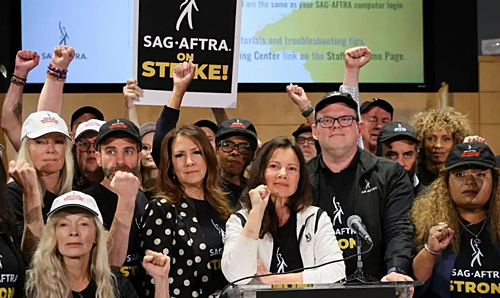
Unionists and Hollywood film studios reached a preliminary agreement this Sunday (24/09) to end the writers’ strike, after almost five months of strikes that suspended the production of films, series and several television programs. The agreement, however, does not include the actors.
The Writers Guild of America (WGA) announced the pact in a joint statement with the Alliance of Motion Picture and Television Producers (AMPTP), which represents studios, streaming services and production companies.
“This was made possible through the enduring solidarity of WGA members and the extraordinary support of our sister unions who joined us on the picket lines for 148 days,” the WGA said.
The agreement, valid for three years, must still be approved by the WGA board before the strike can officially end. The union instructed the writers to wait for this final step before returning to work, but ordered the suspension of pickets with immediate effect.
Around 11,500 WGA members joined the strike, which began on May 2. The stoppage was due to issues involving salaries, defining the size of writing teams in television programs and the use of artificial intelligence in creating scripts.
The terms of the agreement were not immediately disclosed, but, in the category’s last strike, in 2008, the agreement between the parties was approved by 90% of the union’s members.
Actors’ unions maintain strike
On the other hand, the Hollywood Actors Union (SAG-AFTRA), which represents around 160,000 film and television professionals, is still negotiating an end to the strike.
“SAG-AFTRA congratulates the WGA on the preliminary agreement with the AMPTP after 146 days of incredible strength, resilience and solidarity on the picket lines,” the actors’ union said in a statement. “We remain committed to achieving the terms necessary for our members.”
In the statement, SAG-AFTRA clarifies that it continues to “urge the CEOs of the studios, streaming services and AMPTP to return to the negotiating table and form the fair deal that our members deserve and demand.”
The category of around 65 thousand professionals has been on strike since July 14, with actors joining screenwriters on pickets and demonstrations. It was the first time that both unions carried out simultaneous strikes.
The end of the impasse with the screenwriters came after the resumption of negotiations between the two parties last Wednesday, followed by five days of intense debates. According to reports, CEOs of companies such as Disney, Netflix, Warner Bros. Discovery and NBCUniversal. The agreement was reached without the need for intervention from mediators or federal government authorities.
Billion-dollar losses
The shutdowns also affected the work of camera operators, production assistants and other workers in the sector, such as carpenters, florists, costume designers and countless small companies that provide services to film and television productions.
According to economists, the economic losses from the strikes in California and other states that also host production sites, such as New Mexico, Georgia and New York, would be at least 5 billion dollars (R$24 billion).
The two strikes marked a historic moment in Hollywood, with the creative workforce coming into direct confrontation with executives, in a sector transformed by technological advances, from the emergence of streaming services to the potentially paradigmatic rise of artificial intelligence.
Source: www.brasildefato.com.br

